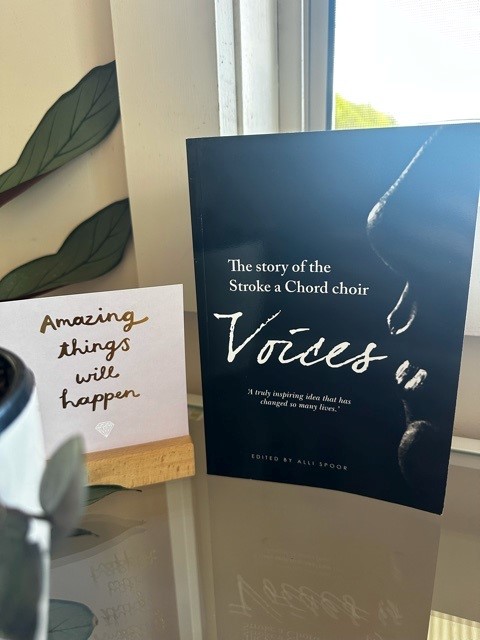.jpg)
Music Therapy and Aphasia
– Part 2
The Stroke a Chord Choir
The voice in song, whether worded or unworded is a beautiful expression of the human spirit. Stroke a chord was a choir for stroke survivors
living with aphasia, formed in 2010 in Melbourne, Australia. Anneliis Way was the founding stroke a chord music therapist and research
assistant. She remained with the group for 2 years and has stayed closely connected to the choir as they continue to sing together 14
years later. Below is an adaptation of her chapter from the book “Voices – The story of the Stroke a Chord Choir”.
Benefit from music therapy today.
Each session is tailored to a person’s individual needs and
goals.
“The power of music for health and wellbeing has been recognized by many, including music therapists. The surprising phenomenon that
those with aphasia can sing even though they cannot speak often astounds. I recall learning about music and the brain when I was studying to
be a music therapist at Melbourne University. I remember vividly the excitement I felt as I learnt about how music could help facilitate
brain injury rehabilitation from helping with gait and movement, to emotional adjustment to speech. What an intriguing job as a music
therapist I was to have.
The seemingly mysterious, that those who cannot speak will often sing is quite simply explained. When someone survives a stroke and the
area of the brain responsible for speech and communication is damaged, often the part responsible for singing is unharmed. Hence, the
beautiful gift of song remains.

Music therapists often use this gift of song when working in stroke rehabilitation. However bringing a group of stroke survivors with aphasia together to form a choir was an innovative idea; we were unaware of any other choir in Australia just for aphasics and were about to encounter relatively unchartered waters
I remember the first time I met with some of the soon to be choir members, informally in a cosy lounge room. Here were a group of stroke
survivors keen to sing and share their music with me. I wanted to spend some time with this group prior to our first formal rehearsal to
find out what sort of songs they knew and liked. I went away from this meeting, with a list of new songs to learn (welcome to life as a
music therapist) and a better idea of where to begin with our first choir session.
Our first rehearsal saw a shy and somewhat uncertain group come together. They were however, ready to sing, or at least willing to give
it a go. I chose simple songs that I thought most would be familiar with. Quiet voices joined together as the words to songs such as ‘You
Are My Sunshine’, ‘Can’t help Falling in Love’ and ‘Waltzing Matilda’ were tentatively sung.
What a stark difference the rehearsals of today are to those early beginnings. Each week rehearsals are filled with laughter and warm
greetings. I once commented to a carer that for a group of people with aphasia you really can’t keep them quiet. New voices were always
welcomed with enthusiasm and choir members frequently shared their achievements and struggles with one another. An atmosphere of support,
encouragement and care permeates each rehearsal and concert.
Since the choir's inception we have watched it increase in number and have seen individual choir members grow in both skill and confidence.
We have seen significant improvements in concentration memory and musical ability. Although my training is as a music therapist, those of
us involved in this projected endeavoured to make sure that it did not feel like another therapy session. Often having spent years in
rehabilitation and therapy programs, we wanted to provide the choir members with an opportunity to have fun, knowing that the very medium
by which this was occurring would reap therapeutic benefits for speech, mood, socialisation and quality of life. That’s the beauty of
working as a music therapist, music is inherently therapeutic. It has been particularly important to me that all choir members, and in fact,
all I work with beyond the choir, are empowered to participate within the realms of their strengths and ability, and vocal activities and
songs have often been adapted to facilitate this...”
The Power of Music
Although I have now relocated to Adelaide, and the choir continues to run with the expertise and support of others, stroke a chord was so much more than a music therapy job to me. It was a place where I was constantly learning and inspired. I was continually moved by the choir’s achievements…a moment when a choir member would find their voice – I’d hear it beginning to soar, or someone would share an achievement such as independently ordering their lunch at a restaurant – often because of the increased confidence the group had instilled in them. I would like to congratulate all past and present members on their involvement in the choir. May we always remember the power of song.
Anneliis is a registered music therapist, trained in neurologic music therapy. She provides music therapy services in the southern suburbs Adelaide, Australia, and continues to be passionate about offering music therapy for stroke survivors and those living with brain injury. If you would like to learn more please contact Anneliis way Today.
Discover the benefits of music therapy today.
Providing home and clinic based music therapy services across the southern suburbs of Adelaide.
